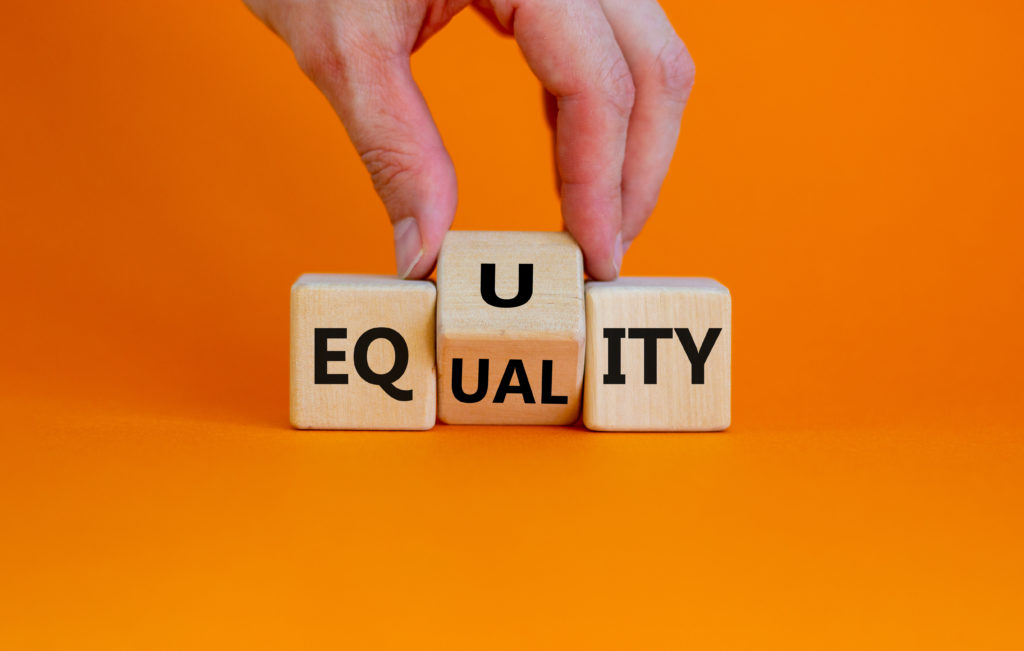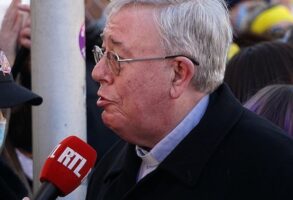
Published September 30, 2021
George Orwell, the writer, and Josef Pieper, the Catholic philosopher, came from very different backgrounds. They had very different views. But both shared a keen interest in the use, and abuse, of language. The reason was simple. Words have power. Words matter. Consider:
The Declaration of Independence states that “all men are created equal.” For Americans, equality is a sacred word. We revere it despite the fact that, in reality, we’re not equal because none of us is identical to anyone else. We have different skills, intellects, deficiencies, and characters. Nor do our lives produce equal happiness or success; no society can guarantee otherwise and remain free. We are each unique, unrepeatable, and uniquely loved by God. We are thus inescapably unequal. Nonetheless, the ideal of political equality properly understood – equality of natural rights and dignity endowed by a Creator, and equality before the law – grounds the American experience. And it has had immense practical value, producing the greatest democratic republic in history.
But words and their meanings can be slippery creatures. In recent years, “equality” as a word in our political vocabulary has undergone its own curious “trans” surgery. The result is that delicious new word, equity. The two words sound similar. And they do share family DNA. Both derive from the Latin root aequus, meaning flat or level. But equity and equality are not the same thing, any more than “freedom of religion” and “freedom of worship” are the same thing. The differences may seem small, but they widen as the two concepts diverge.
Equality suggests sameness, as in the same access to voting, services, and opportunity. It’s typically measurable by material standards like income, poverty rates, crime stats, and education. Equity is more ambiguous. It more clearly implies a should, a heightened sense of right and wrong and the urgency to do something about it. Equity insists that resources should be directed, or redirected, to heal inequities caused by past inequalities. What those inequities and inequalities might be, why they exist, and how to fix them are matters open to dispute and adjudication. So equity is, in effect, a clergy word freighted with moral tension, and there’s nothing wrong with such words. . .in the hands of the right clergy. The trouble is that the “clergy” in today’s post-Christian, secularist culture is our smugly progressive leadership class and its supporting cast of social science shamans and media homilists.
In practice, “equity” is part of a posse of magic nouns. The rest of the posse – words like diversity, inclusion, and tolerance – share a similar moralizing ambiguity, though tolerance was last seen hobbling into the sunset. It’s essentially dead now from exhaustion. Ironically, each of the magic words, taken individually and understood properly, makes excellent sense. We’re a nation of immigrants. Tolerance, diversity, and inclusion are simply statements of American fact. They’re often pursued imperfectly, but they’ve always been part of our nation’s life.
But tolerance no longer serves a purpose in the culture war against enemies of progress, notably those retro Christian beliefs about sex. After all, why tolerate bigots? And in the hands of today’s missionaries of enlightenment, diversity actually means a celebration of separateness and fracture, aggravating divisions along racial, sexual-preference, and ethnic lines, and resulting in more, not less, social conflict. Inclusion means forcing families and religious communities to accept behaviors they find morally destructive. All of which creates turmoil; all of which naturally meets resistance; all of which then requires more extensive and coercive centralized authority to get the job done.
Plenty of sane people sense this. They grasp, at a gut level, Josef Pieper’s warnings that “if the word becomes corrupted, human existence itself will not remain unaffected and untainted,” and that “language, disconnected from the roots of truth. . .invariably turns into an instrument of power.” In effect, as Pieper notes even more brutally, words become “an instrument of rape.” But too many sane people hesitate to speak because they fear being branded as callous or stupid or reactionary. They feel powerless to push back.
And for good reason. When preached by today’s apostles of urgent change, and then chanted endlessly in everything from fashion blogs to mainstream news reporting to athletic shoe commercials, these magic words infect our language with a kind of hypnotic voodoo. The somnambulated masses can then glide forward to a sunny future, above the vulgar trenchwork of logic and debate – unencumbered by either, and washed clean of skepticism.
And that’s exactly the purpose of the words.
Language shapes thought. Thought shapes choices and actions. Choices and actions shape and reshape the world. In this sense, today’s magic nouns are the distant kin of Orwell’s dystopian language “Newspeak.” Its purpose, per Orwell, “was not only to provide a medium of expression for the world view and mental habits proper to the devotees” of a particular ideology, “but to make all other modes of thought impossible.”
Does this sound a little too bleak for a nation with so many good people, and such deep resources for renewal? Maybe. Would that it were so. In any event, we’ll find out soon enough. Liars are doing very well in our nation’s public life at the moment – all those “devout” Catholic members of Congress who sacralize permissive abortion surely head the list – and lies have the habit of growing and spreading like tumors until people name and resist them. So it’s useful to remember that “Lying lips are an abomination to the Lord, but those who act faithfully are his delight.” (Prov 12:22)
The virtue we need at the moment is courage. As Paul said, we’re called to speak the truth with love. (Eph 4:15) With love. But we do need to speak the truth. . .and demand the same from others.
© 2021 The Catholic Thing.
Francis X. Maier is a senior fellow in Catholic studies at the Ethics and Public Policy Center and a senior research associate in Constitutional Studies at the University of Notre Dame.
Francis X. Maier is a Senior Fellow in the Catholic Studies Program at the Ethics and Public Policy Center. Mr. Maier’s work focuses on the intersection of Christian faith, culture, and public life, with special attention to lay formation and action.











